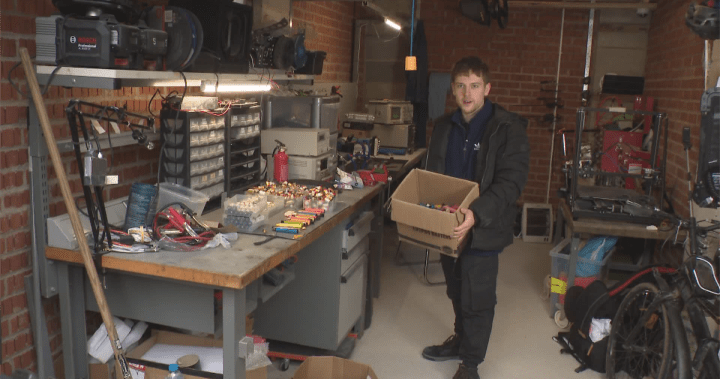It’s estimated almost five million single-use vapes are thrown away every week in the U.K.; that’s about eight every second.
In recent years, usage of the disposable items has risen sharply — including in Canada where, according to one study, it is now the most-used type of e-cigarette among young people.
What many vapers don’t realize is that the devices they discard contain rare earth metals that are key to so many new technologies.
The non-profit group Material Focus estimates the batteries inside all the vapes thrown away in the U.K. in 2022 held enough lithium to power at least 5,000 electric vehicles.
For Chris Doel it’s an unconscionable waste.
Chris Doel is an electronics engineer who designs electric vehicle technology for a wekk-known car brand.
Global News / Braden Latam
Doel is a 25-year-old engineer who works for a large car-maker in England’s Midlands.
“I’m seeing people around me smoking these and throwing them away after one use. And the electronics engineer in me was thinking, ‘How can these be disposable?’” said Doel from his garage workshop in the town of Rugby.
“Especially when you see little blinking lights. I knew that they had possibly valuable electronics inside.”
So, Doel did what any engineer worth his sodium chloride would do — he cracked open a vape to see what the battery cell looked like.
“When I first saw these cells, I was thinking these are remarkably similar to the cells that we actually use inside our e-bike batteries, anyway. So I see no reason why we couldn’t use these instead.

Get breaking National news
For news impacting Canada and around the world, sign up for breaking news alerts delivered directly to you when they happen.
“So the first step is collecting them and that’s something not too hard. They’re littered absolutely everywhere. You find them in bushes, kicking them around on the pavement.”
Doel calculated he’d need 130 of the units to power his bicycle.
Electronics engineer Chris Doel warns that it can be very dangerous to assemble an e-bike battery like this unless you know what you’re doing.
Global News / Braden Latam
He tested each battery to make sure they were safely working, designed the wiring and a 3D-printed casing to hold them together.
Doel warns that no one should try this unless they are fully familiar with electronics and batteries.
“They can generate excessive heat. They can burn you, they can explode, they can burn your house down,” he says.
Doel estimates his homemade e-bike battery cost about a quarter of the price of a commercial model, but he says the project was not about saving money.
“It’s an unbelievable source of e-waste and I’m really glad that I have been able to harvest all these and build some really interesting battery packs,” says Doel.
“Because I’m able to show the rest of the world — and all the other countries that haven’t yet banned them — what they’re capable of, and hopefully accelerate that process and also raise awareness to get people to move to reusable alternatives.”
It’s estimated almost five million single-use vapes are thrown away in the UK every week.
Global News / Braden Latam
The U.K. will ban ban single-use, disposable vapes in 2025, and other countries are set to follow.
Mark Miodownik is a professor of Materials and Society at University College London.
He says the vape waste issue is part of a much greater problem.
“Once you’ve got lithium out (of the ground), you really want to keep hold of it. It’s just an absolute crime to be throwing it away,” says Miodownik.
“Why is throwing away valuable materials cheap? Well, because the price is artificial. It doesn’t include the pollution. And if you were to include the pollution, they would not be cheap and disposability would not be an option.”
Miodownik beleives both legislation and education are key to creating a more circular economy where we reuse, repair or reduce our consumption of valuable or harmful materials.
Chris Doel says his e-bike battery made from 130 recycled vapes can take him about 32 kilometres without pedalling.
Global News / Braden Latam
With the U.K. vape ban imminent, Doel knows time could be running out for him to complete his next projects.
He wants to use hundreds, or even thousands of vapes to create a powerwall — possibly connected to solar panels — to power his workshop, or even his home.
Since one of his YouTube videos went viral, he’s even had people offer to send him their own used vapes.

© 2024 Global News, a division of Corus Entertainment Inc.



